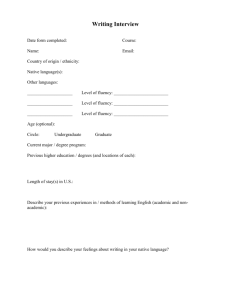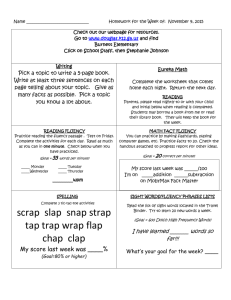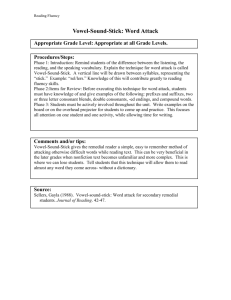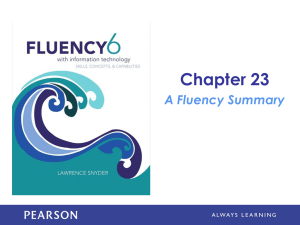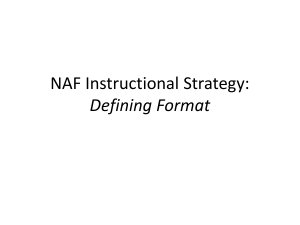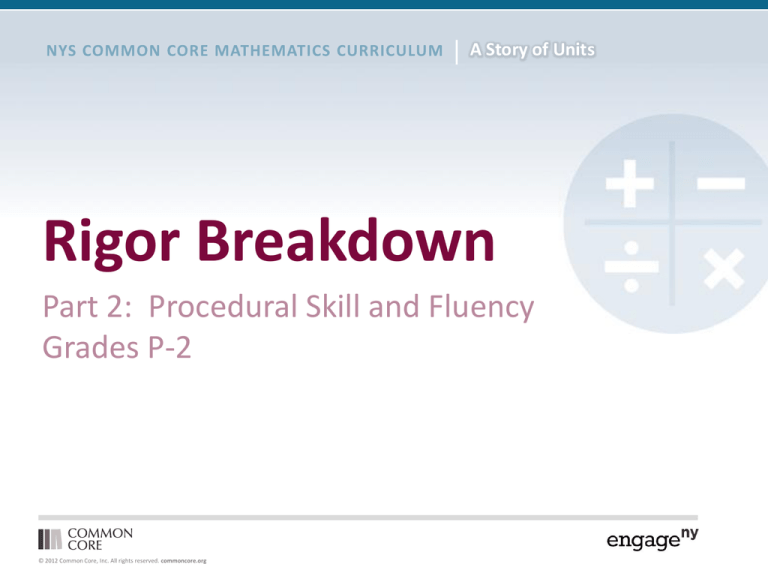
A Story of Units
Rigor Breakdown
Part 2: Procedural Skill and Fluency
Grades P-2
© 2012 Common Core, Inc. All rights reserved. commoncore.org
A Story of Units
Session Objectives
•
•
•
•
•
Understand the fluency component of rigor called for in the
Standards, as defined by guiding documents
Examine various activities that promote fluency in A Story of
Units
Compare and contrast fluency activities and analyze the
impact and advantages of each
Highlight Standards for Mathematical Practice in the fluency
activities in A Story of Units
Recognize the balance and intensity of all three components
of rigor in A Story of Units
2
© 2012 Common Core, Inc. All rights reserved. commoncore.org
A Story of Units
Fluency
Defined by the Instructional Shifts
“Students are expected to have speed and accuracy
with simple calculations; teachers structure class
time and/or homework time for students to
memorize through repetition, core functions.”
3
© 2012 Common Core, Inc. All rights reserved. commoncore.org
A Story of Units
Fluency
Defined by the Publishers’ Criteria
“The word ‘fluently’ is used [in the standards] to set
expectations for fluency.” (page 5)
“Materials in grades K-6 help students make steady
progress throughout the year toward fluent (accurate
and reasonably fast) computation…. Progress toward
these goals is interwoven with students’ developing
conceptual understanding of the operations in
question.” (page 10)
4
© 2012 Common Core, Inc. All rights reserved. commoncore.org
A Story of Units
Required Fluencies
K
K.OA.5 Add/subtract within 5
1
1.OA.6 Add/subtract within 10
2
3
2.OA.2
2.NBT.5
3.OA.7
3.NBT.2
Add/subtract within 20 (know single-digit sums from memory)
Add/subtract within 100
Multiply/divide within 100 (know single-digit products from memory)
Add/subtract within 1000
4
4.NBT.4 Add/subtract within 1,000,000
5
5.NBT.5 Multi-digit multiplication
5
© 2012 Common Core, Inc. All rights reserved. commoncore.org
A Story of Units
Fluency Activities in A Story of Units
• Promote automaticity – allows students to reserve
their cognitive energy for higher-level thinking
• Daily, substantial, sustained, and supported by the
lesson structure
• 10-20 minutes of easy-to-administer activities
• Energetic activities that allow students to see
measureable progress
• Support conceptual understanding and application as
well as the mathematical practices
6
© 2012 Common Core, Inc. All rights reserved. commoncore.org
A Story of Units
AGENDA
Fluency Work – Counting Exercises
Fluency Work – Choral and White Board Exchanges
Fluency Work – Sprints
7
© 2012 Common Core, Inc. All rights reserved. commoncore.org
A Story of Units
Fluency – Counting Exercises
• Appropriate for all grade levels, K-5
• Counting forward and backwards supports addition
and subtraction
• Skip-counting supports multiplication
8
© 2012 Common Core, Inc. All rights reserved. commoncore.org
A Story of Units
Lesson Engagement – Skip-counting
Reflections:
• How could counting exercises have
an impact or a benefit in your
classes, school or district?
• How might counting exercises
address trouble areas that your
students experience?
9
© 2012 Common Core, Inc. All rights reserved. commoncore.org
A Story of Units
Video Clip – Counting Exercises
Reflections:
• How could counting exercises have
an impact or a benefit in your
classes, school or district?
• How might counting exercises
address trouble areas that your
students experience?
10
© 2012 Common Core, Inc. All rights reserved. commoncore.org
A Story of Units
Video Clip: Counting Exercises for K-1
This video is posted in the video library on EngageNY:
http://engageny.org/video-library
11
© 2012 Common Core, Inc. All rights reserved. commoncore.org
A Story of Units
Video Clip: Counting with Bundles
This video is posted in the video library on EngageNY:
http://engageny.org/video-library
12
© 2012 Common Core, Inc. All rights reserved. commoncore.org
A Story of Units
Counting Exercises
Reflections:
• How could counting exercises have
an impact or a benefit in your
classes, school or district?
• How might counting exercises
address trouble areas that your
students experience?
13
© 2012 Common Core, Inc. All rights reserved. commoncore.org
A Story of Units
Counting Exercises
Key Points
• They are appropriate for all grade levels, PK-5.
• Counting forward and backwards supports addition
and subtraction.
• Skip-counting supports multiplication.
• Counting exercises can be timed competitions, either
as a class or as individuals.
14
© 2012 Common Core, Inc. All rights reserved. commoncore.org
A Story of Units
AGENDA
Fluency Work – Counting Exercises
Fluency Work – Choral and White Board Exchanges
Fluency Work – Sprints
15
© 2012 Common Core, Inc. All rights reserved. commoncore.org
A Story of Units
Fluency – Choral and White Board Exchanges
• Quick, efficient interactive drills and games
• Applies to a wide range of skills
• Making 10 using ten-frame cards for adding and subtracting
• Computing 1 less than, 2 more than, etc.
• Interpreting words with expressions
16
© 2012 Common Core, Inc. All rights reserved. commoncore.org
A Story of Units
Video Clip – Choral and White Board Exchanges
Reflections:
• How is conceptual understanding being
reinforced in these examples of fluency
work?
17
© 2012 Common Core, Inc. All rights reserved. commoncore.org
A Story of Units
Video Clip: Ten-Frame Flash
This video is posted in the video library on EngageNY:
http://engageny.org/video-library
18
© 2012 Common Core, Inc. All rights reserved. commoncore.org
A Story of Units
Lesson Engagement –
White Board Exchange
Take the challenge!
19
© 2012 Common Core, Inc. All rights reserved. commoncore.org
A Story of Units
Choral and White Board Exchanges
Reflections:
• How is conceptual understanding being
reinforced in these examples of fluency
work?
20
© 2012 Common Core, Inc. All rights reserved. commoncore.org
A Story of Units
Key Points
• Exchanges can be used as a quick form of
assessment.
• Exchanges allow for rapid completion of multiple
practice problems.
• Exchanges create intensity in student practice.
• Exchanges give students immediate feedback.
21
© 2012 Common Core, Inc. All rights reserved. commoncore.org
A Story of Units
AGENDA
Fluency Work – Counting Exercises
Fluency Work – Choral and White Board Exchanges
Fluency Work – Sprints
22
© 2012 Common Core, Inc. All rights reserved. commoncore.org
A Story of Units
Fluency – Sprints
Grade 2—Module 3 Fluency Progression
• A fast pace is essential. While administering Sprints, teachers
assume the role of athletic coaches. A rousing routine fuels
students’ motivation to do their personal best.
• Student recognition of increasing success is critical, and so
every improvement is celebrated. One Sprint has two parts
with closely related problems on each. Students complete the
two parts of the Sprint in quick succession with the goal of
improving on the second part, even if only by one more.
• With practice the routine takes about 8-10 minutes.
23
© 2012 Common Core, Inc. All rights reserved. commoncore.org
A Story of Units
Lesson Engagement – Sprints
Take the challenge!
• Sprint A: page 3.B.20
• Sprint B: page 3.B.21
24
© 2012 Common Core, Inc. All rights reserved. commoncore.org
A Story of Units
Fluency – Sprints
• Round B of the Sprint consolidates student progress, and
builds confidence, especially for lower performing students.
• Intelligent design and sequence of delivery makes the Sprint
superior to computer-generated worksheets.
• Sprints are aligned to individual lessons and topics and have
been written to account for a large range of skill levels.
• Teachers are encouraged to study the sequence of problems in
the Sprints from A Story of Units and create their own Sprints.
• Sprints do not have to be administered daily, but certainly can
be done at least 2-3 times per week.
25
© 2012 Common Core, Inc. All rights reserved. commoncore.org
A Story of Units
Sprints
Reflections:
•
What evidence is there of the Standards
for Mathematical Practice?
26
© 2012 Common Core, Inc. All rights reserved. commoncore.org
A Story of Units
Video Clip - Sprints
Reflections:
•
In what ways are Sprints
advantageous in meeting the
demands of fluency?
27
© 2012 Common Core, Inc. All rights reserved. commoncore.org
A Story of Units
Video Clip: Sprints – Fluency in Action
This video is posted in the video library on EngageNY:
http://engageny.org/video-library
28
© 2012 Common Core, Inc. All rights reserved. commoncore.org
A Story of Units
Sprints
Reflections:
•
In what ways are Sprints
advantageous in meeting the
demands of fluency?
29
© 2012 Common Core, Inc. All rights reserved. commoncore.org
A Story of Units
Key Points
• Sprints allow for rapid completion of multiple
practice problems.
• Sprints create intensity in student practice.
• Sprints give students quick feedback.
• Sprints motivate students with a near-term goal for
improvement.
30
© 2012 Common Core, Inc. All rights reserved. commoncore.org
A Story of Units
Fluency Progressions in A Story of Units
Each module includes a Fluency Progression:
•
•
•
Banks of activities that teachers may either select and use, or
study as they create their own.
Activities revisit previously learned material to develop
automaticity, anticipate future concepts, and strategically
preview or build skills for the day’s concept lesson.
As teachers work with the materials, they should adjust
them in consideration of their particular students’ needs.
31
© 2012 Common Core, Inc. All rights reserved. commoncore.org
A Story of Units
Key Points
•
•
•
•
•
Fluency standards exist for each grade.
Fluency can be promoted in a variety of ways.
Fluency work is usually included as a warm-up at the
beginning of a lesson for approximately 10-20 minutes.
A Story of Units provides frequent, rich opportunities for
students to work toward achieving fluency.
Fluency work often also provides opportunities to nurture the
Standards of Mathematical Practice.
32
© 2012 Common Core, Inc. All rights reserved. commoncore.org
A Story of Units
Next Steps
• What type of fluency activity are you most eager to
incorporate into your current teaching?
• How can you help your colleagues implement the
fluency component of rigor?
33
© 2012 Common Core, Inc. All rights reserved. commoncore.org
A Story of Units
A Call for Equal Intensity and Balance
The Instructional Shifts:
“Students are practicing and understanding. There is
more than a balance between these two things in the
classroom – both are occurring with intensity.
Teachers create opportunities for students to
participate in ‘drills’ and make use of those skills
through extended application of math concepts...”
34
© 2012 Common Core, Inc. All rights reserved. commoncore.org
A Story of Units
A Call for Equal Intensity and Balance
The Publishers’ Criteria:
“To help students meet the expectations of the
Standards, educators will need to pursue, with equal
intensity, three aspects of rigor in the major work of
each grade: conceptual understanding, procedural
skill and fluency, and applications.” (page 5)
“Materials and tools reflect the balances in the
Standards…” (page 9)
35
© 2012 Common Core, Inc. All rights reserved. commoncore.org
A Story of Units
Intensity and Balance in A Story of Units
36
© 2012 Common Core, Inc. All rights reserved. commoncore.org
A Story of Units
Intensity and Balance in A Story of Units
37
© 2012 Common Core, Inc. All rights reserved. commoncore.org

